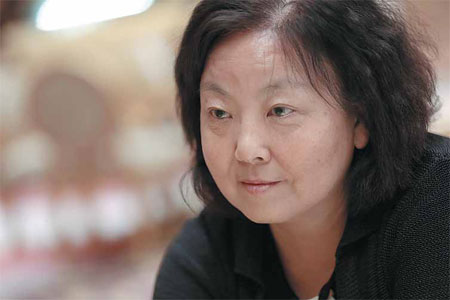| About Hubei | Culture & Arts | ||
| Attractions | Routes | ||
| Dining | Shopping | ||
| Hotels | Transportation | ||
| Entertainment | Travel agencies |
Jingshan to attract Wuhan tourists
Storytelling queen
For the love of Wuhan
Dangyang to promote tourism


Storytelling queen
By Sun Ye (China Daily)
Updated: 2013-10-15
Author Fang Fang says she is full of story ideas but does not have enough time to write. And she tells Sun Ye she has been pleasantly surprised by the great attention paid to her latest novel.
Round eyes, an impish nose and small cherry lips give Fang Fang the look of a quick-witted, animated storyteller. And, she is. The 58-year-old best-selling author says she realized she had the gift of storytelling since childhood. "If you had asked my classmates then 'Who will grow up to be a writer?', they would have said it's me."
"They nicknamed me queen of storytelling."
Her friends and colleagues would bribe her with fruits and snacks in exchange for her stories. "One of my college friends would follow me around each day asking, 'What's next?'"
Her latest novel is Tu Ziqiang's Personal Sad Story released by the Beijing October Publishing House of Art and Literature. The book of suspense, which offers insights into the mind, is clearly written, with drawing narration - her signature style. It is a success, as predicted. But it nevertheless surprised the author herself with the discussions it attracted.

"I didn't expect it to create such a wave," she says.
The story of Tu Ziqiang follows a young man's college days and his first menial jobs. Although he holds a college education, his efforts never translate into anything meaningful, mostly owing to his poor, rural upbringing. Tu eventually kills himself.
"He has to die. In my earlier draft, he brought his ailing mother to death's door, too," Fang says. "I see no way out for the kid. If he doesn't die, he can only turn terribly vicious."
The tragedy of that obscure young man sets the country mourning about the current time, which offers the younger generation limited opportunities.
"It's Fang Fang's writing at its most powerful, and it's so simply written," says Han Jingqun, chief of the publishing house who oversaw the book.
"I haven't been this touched in years, to the extent that I almost shed manly tears.
"Only a reflective, conscientious writer could develop stories that resonate not only with the young, but with almost anyone."
Fang was inspired by her years of observing and sponsoring rural dropout students.
The winner of Lu Xun Literary Award has a repertoire of literature that portrays the underclass. Such stories made her a champion of the New Realism school (since the 1980s), where the sordid and ground bits of life make their ways into some of her most celebrated works, like Landscape and Feng Shui.
Born into a family of engineers, Fang had spent four years in mid-1970s as a porter "without knowing whether one could finally get out of this life".
"That's the first university I went to. It totally changed my understanding of the group. I wasn't taking note, I was one of them," she says.
She went to the prestigious Wuhan University afterwards, winning recognition for her talent early and opportunities to work as a professional writer and editor ever since.
She also writes about the plights of the country's intellectuals. "But compared with the bottom rung who have to fight for basic food and board, their life is not that hard."
"It's what us Hubei writers do, we are always more concerned with the ills of the society," says Fang, who is also chief of the Hubei Writers Association.
These days, Fang has turned to historical documents. "I read to reconstruct Wuhan as it was 100 years ago," she says.
She has completed several books, both fiction and documentary on the city's past.
"I have a studio set in my head, down to every corner and ornament of the city. And I see my characters go through life in that setting as if in a film."
For that matter, she has so many story ideas from heaps of historical records. "You cannot count with two hands the things I want to write," the author says.
But her fans will not get to read those stories on her mind soon enough, even though she has always been a fast and inspired writer.
"Now, I deliberately slow down to fine tune the writing, otherwise I write almost too fast on a spur."
Besides, she's busy promoting literature in her role as chief of the writers association, setting up lecture series and seminars for the province.
"I have never been short of story ideas. What I need is time," she says.
Contact the writer at [email protected].
|
Author Fang Fang is known for her simple but powerful writing and some of her works are inspired by years of observing and sponsoring rural students who had dropped out. Jiang Dong / China Daily |
